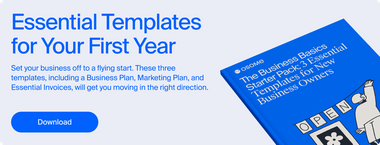What To Do After You’ve Incorporated Your Business in the UK
Consider this your step-by-step action plan for the first 12 months of navigating and managing a new business. We also include valuable links to resources that help you dive deeper into each topic.

Whether you're newly incorporated or about to start the process, it can be overwhelming and confusing making sense of government speak and bureaucracy.
We're here to break down the business jargon and give you a step-by-step action plan for the first 12 months to help guide you through navigating and managing a new business. We also include valuable links to resources that help you dive deeper into each topic.
Ready? Let's do this!
What Are Your Responsibilities?
You are or will soon be the director of a company, which means you have some very important responsibilities you need to take care of. For a more detailed guide from the read here: Here's a quick overview.
- Keep company records and report changes;
- File your accounts and your Company Tax Return;
- Pay Corporation Tax.
We'll get into each of these in the rest of this article, but also check out our blog, which has a load of helpful resources for newly incorporated companies.
Know Your Dates
Once officially set up and functioning as a business, you are subject to statutory filing requirements. There are important dates you need to know to avoid fines.
Annual accounts
When: 9 months after your company's financial year ends
Your first accounts often cover more than 12 months, starting from the day your company was set up ('incorporated') and ending on the date Companies House sets for the end of your company's financial year.
Confirmation statement
When: Every 12 months
Every company must file a confirmation statement. It confirms the information Companies House hold about your company is up to date.
Corporation tax
When: 9 months and 1 day after your accounting period ends
You must pay Corporation Tax on profits when doing business as a limited company. If your company is based in the U.K., you pay this tax on all your profits from the U.K. and abroad.
Company tax return
When: 12 months after your accounting period for Corporation Tax ends
The period covered by your tax return cannot be longer than 12 months. So you may have to file two tax seperate returns to cover the period of your first accounts. If you do, you'll also have two payment deadlines.
Essential Paperwork
Everyone loves paperwork, right? Company registration documents are important documents issued by Companies House once you have incorporated. All this paperwork can be sorted for you by us, so you don't have to. These documents are:
Certificate of Incorporation
This certificate is evidence that your company is legally registered as a business in the UK. You receive this certificate when you complete your company registration with Companies House. You need it for everything from applying for permits, opening a business bank account, filing taxes to hiring staff
Memorandum of Association
This legal statement has the names of all your founding member (shareholders/guarantors) and confirms that each member wants to form a company under the Companies Act
Articles of Association
The article of association is a document that defines your company's rules and how you conduct business. You can decide if you want to use the templates provided by Companies House or use them as a guide and create your own rules.
Opening Your First Bank Account
We know setting up and getting pre-approved for a business bank account is a bit of a challenge in the U.K. Foreign corporate entities can have a hard time opening a business account, as do individuals with a bad credit history. Tricky but not impossible.
Need more details?
We explain everything here in our handy guide to opening your first business bank account.
Not everyone is required to have a separate business account. Sole Traders or freelancers, for example, don't have to. However, when you are a limited company, you are considered a separate entity, and it is a legal requirement to open a separate bank account.
An account can be opened online, but some banks require you to visit their branch in person with a valid I.D. to check you're human, not a robot. If you want to avoid having to figure this out on your own and open an account that’s right for your business, we are here to help.
Record Keeping
It's your job to keep detailed, up-to-date records of all company financial affairs and transactions. These include:
- All money spent by the company with proof of receipts
- Every pound received by the company — sales invoices and ecommerce reports in PDF
- Any other relevant documents — closing bank statements in PDF

Reporting Changes
It's your job as director to prepare and deliver documents to HMRC. You must tell if you are changing:
- Your company's registered office address
- Your business contact details change — e.g. your name, gender, business name, your personal or trading address
- You appoint an accountant or tax adviser
- When directors change their personal details, like their address
- People with significant control (PSC) change or their personal details change like a new address
Tell me more
In our mission to make our expertise accessible to everyone, we've created a resource library to help you in the first 12 months of running your business. And, if you are not yet incorporated but are about to register your company, Osome can help you every step of the way.







